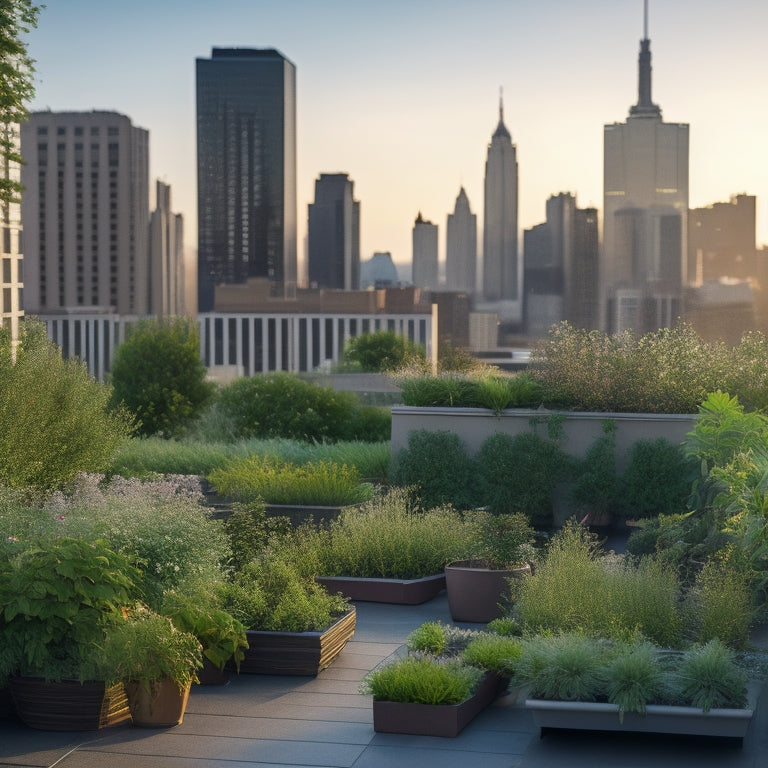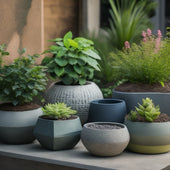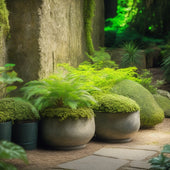
3 Essential Irrigation Systems for Rooftop Gardens
Share
You're investing in a rooftop garden, which can be up to 20% more productive than traditional gardens, but only if you get irrigation right. To guarantee success, you'll need three essential irrigation systems. First, drip irrigation delivers water directly to plant roots, reducing evaporation and runoff while maintaining consistent soil moisture levels. Next, sprinkler systems provide even coverage, ensuring every plant receives the right amount of water. Finally, smart controllers automate watering schedules, adjusting for soil moisture data and weather-based scheduling. By implementing these systems, you'll be well on your way to creating a thriving rooftop oasis, and there's more to explore to take it to the next level.
Key Takeaways
• Drip irrigation delivers water directly to plant roots, reducing evaporation and runoff for optimal water efficiency in rooftop gardens.
• Sprinkler systems provide even water distribution, ensuring every plant receives the right amount of water, especially in gardens with diverse plant species.
• Smart controllers with soil moisture sensors automate watering schedules, adjusting for temperature, humidity, and precipitation to prevent water waste.
• Customizing irrigation systems based on specific plant needs promotes healthy growth, minimizes water waste, and creates an ideal growing environment.
• Efficient irrigation systems conserve water, promote sustainable gardening practices, and enhance plant resilience to drought and extreme weather conditions.
Drip Irrigation for Water Efficiency
When designing an irrigation system for your rooftop garden, incorporating drip irrigation is a crucial step towards achieving water efficiency. It allows you to deliver water directly to the roots of plants, reducing evaporation and runoff. This targeted approach ensures that soil moisture levels are consistently maintained, promoting healthy plant growth and development.
By delivering water directly to the roots, you'll notice improved plant health, as the risk of overwatering and underwatering is greatly reduced. Drip irrigation also encourages deep root growth, making your plants more resilient to drought and extreme weather conditions.
As you plan your drip irrigation system, consider the specific needs of your plants. Different plants have varying water requirements, so it's vital to customize your system to meet these needs. By doing so, you'll create an ideal growing environment that fosters healthy plant growth and minimizes water waste.
With a well-designed drip irrigation system, you'll enjoy a thriving rooftop garden that not only looks amazing but also helps you conserve this precious resource.
Sprinkler Systems for Even Coverage
As you complement your drip irrigation system with a sprinkler system, you'll achieve even coverage across your rooftop garden, guaranteeing that every plant receives the appropriate amount of water. This combination is especially useful for rooftop gardens with diverse plant species, as it caters to their individual watering needs.
When selecting a sprinkler system, consider the water pressure required to reach all areas of your garden. A pressure of 30-40 psi is usually sufficient, but this may vary depending on the size and layout of your rooftop space.
During the installation process, make sure that sprinkler heads are spaced evenly and angled correctly to prevent water from being wasted on walkways or walls. It's also essential to choose sprinkler heads that can withstand wind, sun, and other environmental factors common in rooftop gardens.
Smart Controllers for Automated Watering
By integrating a smart controller into your rooftop garden's irrigation system, you'll be able to automate watering schedules and guarantee that your plants receive the exact amount of water they need, at the right time. This advanced technology allows for precise control over your irrigation system, making certain that your plants thrive without wasting a single drop of water.
With a smart controller, you can connect soil moisture sensors to monitor the moisture levels in your soil. This data is then used to adjust the watering schedule accordingly, so your plants receive exactly what they need.
You can also program the controller to follow weather-based scheduling, taking into account factors like temperature, humidity, and precipitation. This ensures that your plants receive the right amount of water, even on rainy days or during periods of drought.
Frequently Asked Questions
Can I Use a Rooftop Irrigation System With a Green Roof?
You can definitely use a rooftop irrigation system with a green roof, leveraging its benefits like insulation and stormwater management. Design an irrigation system that complements your green roof's specific needs, ensuring efficient water distribution and minimizing evapotranspiration.
How Do I Prevent Irrigation Pipes From Freezing in Winter?
You'll be shocked to know that 90% of irrigation pipe damage occurs in winter! To prevent this, you'll need to prioritize winter maintenance, using insulation techniques, heat tape, and underground heating solutions to keep your pipes warm and functional.
Are Rooftop Irrigation Systems Compatible With Solar Panels?
You can seamlessly integrate rooftop irrigation systems with solar panels, guaranteeing water conservation and energy efficiency. Proper system maintenance guarantees peak performance, while solar panel integration maximizes energy harvesting, giving you freedom from utility bills.
Do I Need to Fertilize My Rooftop Garden Separately?
When you're tending to your rooftop garden, you'll need to fertilize separately, as plant nutrient requirements vary; efficient fertilizer application is key to thriving plants, so consider a fertilizer schedule tailored to your garden's specific needs.
Can I Install an Irrigation System on a Sloping Rooftop?
'Ah, the thrill of defying gravity on a sloping rooftop! You'll need specialized drainage solutions to prevent waterlogged soil. Installing an irrigation system with water-efficient features will guarantee your plants thrive, not drown, in this precarious paradise.'
Related Posts
-

5 Best DIY Planter Ideas to Upcycle Concrete
You're about to breathe new life into discarded concrete blocks by transforming them into functional and visually app...
-

5 Best DIY Planter Ideas to Upcycle Concrete
You're about to breathe new life into discarded concrete blocks by transforming them into functional and visually app...
-

5 Best DIY Planter Ideas to Upcycle Concrete
You're about to breathe new life into discarded concrete blocks by transforming them into functional and visually app...
-

5 Best DIY Planter Ideas to Upcycle Concrete
You're about to breathe new life into discarded concrete blocks by transforming them into functional and visually app...
-

5 Best DIY Planter Ideas to Upcycle Concrete
You're about to breathe new life into discarded concrete blocks by transforming them into functional and visually app...
-

5 Best DIY Planter Ideas to Upcycle Concrete
You're about to breathe new life into discarded concrete blocks by transforming them into functional and visually app...
-

5 Best DIY Planter Ideas to Upcycle Concrete
You're about to breathe new life into discarded concrete blocks by transforming them into functional and visually app...
-

5 Best DIY Planter Ideas to Upcycle Concrete
You're about to breathe new life into discarded concrete blocks by transforming them into functional and visually app...
-

5 Best DIY Planter Ideas to Upcycle Concrete
You're about to breathe new life into discarded concrete blocks by transforming them into functional and visually app...
-

5 Best DIY Planter Ideas to Upcycle Concrete
You're about to breathe new life into discarded concrete blocks by transforming them into functional and visually app...
-

5 Best DIY Planter Ideas to Upcycle Concrete
You're about to breathe new life into discarded concrete blocks by transforming them into functional and visually app...
-

5 Best DIY Planter Ideas to Upcycle Concrete
You're about to breathe new life into discarded concrete blocks by transforming them into functional and visually app...
-

5 Best DIY Planter Ideas to Upcycle Concrete
You're about to breathe new life into discarded concrete blocks by transforming them into functional and visually app...
-

5 Best DIY Planter Ideas to Upcycle Concrete
You're about to breathe new life into discarded concrete blocks by transforming them into functional and visually app...
-

5 Best DIY Planter Ideas to Upcycle Concrete
You're about to breathe new life into discarded concrete blocks by transforming them into functional and visually app...
-

5 Best DIY Planter Ideas to Upcycle Concrete
You're about to breathe new life into discarded concrete blocks by transforming them into functional and visually app...
-

5 Best DIY Planter Ideas to Upcycle Concrete
You're about to breathe new life into discarded concrete blocks by transforming them into functional and visually app...
-

5 Best DIY Planter Ideas to Upcycle Concrete
You're about to breathe new life into discarded concrete blocks by transforming them into functional and visually app...
-

10 Best Shade Garden Planters Using Concrete Blocks
You're about to discover the perfect way to add industrial chic to your shade garden while ensuring healthy plant gro...
-

10 Best Shade Garden Planters Using Concrete Blocks
You're about to discover the perfect way to add industrial chic to your shade garden while ensuring healthy plant gro...
-

10 Best Shade Garden Planters Using Concrete Blocks
You're about to discover the perfect way to add industrial chic to your shade garden while ensuring healthy plant gro...
-

10 Best Shade Garden Planters Using Concrete Blocks
You're about to discover the perfect way to add industrial chic to your shade garden while ensuring healthy plant gro...
-

10 Best Shade Garden Planters Using Concrete Blocks
You're about to discover the perfect way to add industrial chic to your shade garden while ensuring healthy plant gro...
-

10 Best Shade Garden Planters Using Concrete Blocks
You're about to discover the perfect way to add industrial chic to your shade garden while ensuring healthy plant gro...
-

10 Best Shade Garden Planters Using Concrete Blocks
You're about to discover the perfect way to add industrial chic to your shade garden while ensuring healthy plant gro...
-

10 Best Shade Garden Planters Using Concrete Blocks
You're about to discover the perfect way to add industrial chic to your shade garden while ensuring healthy plant gro...
-

10 Best Shade Garden Planters Using Concrete Blocks
You're about to discover the perfect way to add industrial chic to your shade garden while ensuring healthy plant gro...
-

10 Best Shade Garden Planters Using Concrete Blocks
You're about to discover the perfect way to add industrial chic to your shade garden while ensuring healthy plant gro...
-

10 Best Shade Garden Planters Using Concrete Blocks
You're about to discover the perfect way to add industrial chic to your shade garden while ensuring healthy plant gro...
-

10 Best Shade Garden Planters Using Concrete Blocks
You're about to discover the perfect way to add industrial chic to your shade garden while ensuring healthy plant gro...
-

10 Best Shade Garden Planters Using Concrete Blocks
You're about to discover the perfect way to add industrial chic to your shade garden while ensuring healthy plant gro...
-

10 Best Shade Garden Planters Using Concrete Blocks
You're about to discover the perfect way to add industrial chic to your shade garden while ensuring healthy plant gro...
-

10 Best Shade Garden Planters Using Concrete Blocks
You're about to discover the perfect way to add industrial chic to your shade garden while ensuring healthy plant gro...
-

10 Best Shade Garden Planters Using Concrete Blocks
You're about to discover the perfect way to add industrial chic to your shade garden while ensuring healthy plant gro...
-

10 Best Shade Garden Planters Using Concrete Blocks
You're about to discover the perfect way to add industrial chic to your shade garden while ensuring healthy plant gro...
-

10 Best Shade Garden Planters Using Concrete Blocks
You're about to discover the perfect way to add industrial chic to your shade garden while ensuring healthy plant gro...
-

10 Best Shade Garden Planters Using Concrete Blocks
You're about to discover the perfect way to add industrial chic to your shade garden while ensuring healthy plant gro...
-

10 Best Shade Garden Planters Using Concrete Blocks
You're about to discover the perfect way to add industrial chic to your shade garden while ensuring healthy plant gro...
-

10 Best Shade Garden Planters Using Concrete Blocks
You're about to discover the perfect way to add industrial chic to your shade garden while ensuring healthy plant gro...
-

10 Best Shade Garden Planters Using Concrete Blocks
You're about to discover the perfect way to add industrial chic to your shade garden while ensuring healthy plant gro...
-

10 Best Shade Garden Planters Using Concrete Blocks
You're about to discover the perfect way to add industrial chic to your shade garden while ensuring healthy plant gro...
-

10 Best Shade Garden Planters Using Concrete Blocks
You're about to discover the perfect way to add industrial chic to your shade garden while ensuring healthy plant gro...
-

10 Best Shade Garden Planters Using Concrete Blocks
You're about to discover the perfect way to add industrial chic to your shade garden while ensuring healthy plant gro...
-

10 Best Shade Garden Planters Using Concrete Blocks
You're about to discover the perfect way to add industrial chic to your shade garden while ensuring healthy plant gro...
-

10 Best Shade Garden Planters Using Concrete Blocks
You're about to discover the perfect way to add industrial chic to your shade garden while ensuring healthy plant gro...
-

10 Best Shade Garden Planters Using Concrete Blocks
You're about to discover the perfect way to add industrial chic to your shade garden while ensuring healthy plant gro...
-

10 Best Shade Garden Planters Using Concrete Blocks
You're about to discover the perfect way to add industrial chic to your shade garden while ensuring healthy plant gro...
-

10 Best Shade Garden Planters Using Concrete Blocks
You're about to discover the perfect way to add industrial chic to your shade garden while ensuring healthy plant gro...
-

10 Best Shade Garden Planters Using Concrete Blocks
You're about to discover the perfect way to add industrial chic to your shade garden while ensuring healthy plant gro...
-

10 Best Shade Garden Planters Using Concrete Blocks
You're about to discover the perfect way to add industrial chic to your shade garden while ensuring healthy plant gro...
-

10 Best Shade Garden Planters Using Concrete Blocks
You're about to discover the perfect way to add industrial chic to your shade garden while ensuring healthy plant gro...
-

10 Best Shade Garden Planters Using Concrete Blocks
You're about to discover the perfect way to add industrial chic to your shade garden while ensuring healthy plant gro...
-

10 Best Shade Garden Planters Using Concrete Blocks
You're about to discover the perfect way to add industrial chic to your shade garden while ensuring healthy plant gro...
-

Accurate Measuring for DIY Block Planters Made Easy
As you begin building a DIY block planter, precise measurement is essential for a sturdy structure that can support s...
-

Accurate Measuring for DIY Block Planters Made Easy
As you begin building a DIY block planter, precise measurement is essential for a sturdy structure that can support s...
-

Accurate Measuring for DIY Block Planters Made Easy
As you begin building a DIY block planter, precise measurement is essential for a sturdy structure that can support s...
-

Accurate Measuring for DIY Block Planters Made Easy
As you begin building a DIY block planter, precise measurement is essential for a sturdy structure that can support s...
-

Accurate Measuring for DIY Block Planters Made Easy
As you begin building a DIY block planter, precise measurement is essential for a sturdy structure that can support s...
-

Accurate Measuring for DIY Block Planters Made Easy
As you begin building a DIY block planter, precise measurement is essential for a sturdy structure that can support s...
-

Accurate Measuring for DIY Block Planters Made Easy
As you begin building a DIY block planter, precise measurement is essential for a sturdy structure that can support s...
-

Accurate Measuring for DIY Block Planters Made Easy
As you begin building a DIY block planter, precise measurement is essential for a sturdy structure that can support s...
-

Accurate Measuring for DIY Block Planters Made Easy
As you begin building a DIY block planter, precise measurement is essential for a sturdy structure that can support s...
-

Accurate Measuring for DIY Block Planters Made Easy
As you begin building a DIY block planter, precise measurement is essential for a sturdy structure that can support s...
-

Accurate Measuring for DIY Block Planters Made Easy
As you begin building a DIY block planter, precise measurement is essential for a sturdy structure that can support s...
-

Accurate Measuring for DIY Block Planters Made Easy
As you begin building a DIY block planter, precise measurement is essential for a sturdy structure that can support s...
-

Accurate Measuring for DIY Block Planters Made Easy
As you begin building a DIY block planter, precise measurement is essential for a sturdy structure that can support s...
-

Accurate Measuring for DIY Block Planters Made Easy
As you begin building a DIY block planter, precise measurement is essential for a sturdy structure that can support s...
-

Accurate Measuring for DIY Block Planters Made Easy
As you begin building a DIY block planter, precise measurement is essential for a sturdy structure that can support s...
-

Accurate Measuring for DIY Block Planters Made Easy
As you begin building a DIY block planter, precise measurement is essential for a sturdy structure that can support s...
-

Accurate Measuring for DIY Block Planters Made Easy
As you begin building a DIY block planter, precise measurement is essential for a sturdy structure that can support s...
-

Accurate Measuring for DIY Block Planters Made Easy
As you begin building a DIY block planter, precise measurement is essential for a sturdy structure that can support s...
-

Accurate Measuring for DIY Block Planters Made Easy
As you begin building a DIY block planter, precise measurement is essential for a sturdy structure that can support s...
-

Accurate Measuring for DIY Block Planters Made Easy
As you begin building a DIY block planter, precise measurement is essential for a sturdy structure that can support s...
-

Accurate Measuring for DIY Block Planters Made Easy
As you begin building a DIY block planter, precise measurement is essential for a sturdy structure that can support s...
-

Accurate Measuring for DIY Block Planters Made Easy
As you begin building a DIY block planter, precise measurement is essential for a sturdy structure that can support s...
-

Accurate Measuring for DIY Block Planters Made Easy
As you begin building a DIY block planter, precise measurement is essential for a sturdy structure that can support s...
-

Accurate Measuring for DIY Block Planters Made Easy
As you begin building a DIY block planter, precise measurement is essential for a sturdy structure that can support s...
-

Accurate Measuring for DIY Block Planters Made Easy
As you begin building a DIY block planter, precise measurement is essential for a sturdy structure that can support s...
-

Accurate Measuring for DIY Block Planters Made Easy
As you begin building a DIY block planter, precise measurement is essential for a sturdy structure that can support s...
-

Accurate Measuring for DIY Block Planters Made Easy
As you begin building a DIY block planter, precise measurement is essential for a sturdy structure that can support s...


